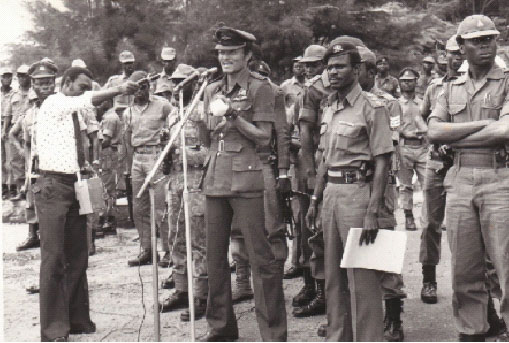After the PNP was violently overthrown on 31 December 1981, the PNDC Government declared both Revolution Day (31 December) and 4 June as public holidays by a yearly ritual of executive fiats, and not by legislation.
It was only on 13 June 1989 that PNDCL 220 was passed to formally legislate the two controversial holidays that had hitherto been celebrated by executive fiat: 4 June (to mark violent overthrow of SMCD II by the AFRC) and 31 December (to mark the violent overthrow of the PNP by the PNDC.)
31 December was the first to be removed when on 23 December 1994, the Supreme Court, by a very slim majority of 5 to 4 in New Patriotic Party v. Attorney-General, declared the celebration of the 31 December coup as unconstitutional.
But 4 June, which was not the subject of that court decision, remained on the statute books. However, clearly, the appetite to celebrate it as a public holiday was on the decline, and its days were clearly numbered. It therefore came as no surprise when in 2001, the then Parliament dominated by the NPP passed the current Public Holidays Act which repealed and replaced PNDC 220 and removed 4 June as a public holiday from the statute books. With this, every holiday that marked the violent military overthrow of any Government in Ghana was finally and rightly removed from our statute books.
But that would not have stopped any government from reverting to celebrating 4 June as a holiday either by resuming the executive fiat route or amending the law to re-introduce it. The same could not be said of 31 December because article 107(a) of the Constitution provides that Parliament does not have the power to pass any law “to alter the decision or judgment of any court as between the parties subject to that decision or judgment.â€
THE FINAL NAIL
In the weeks leading to 4 June 2009, I noticed that several lawyers who appeared in court were avoiding that date in taking case adjournments. The reason was that they (and probably most Ghanaians) did not know whether or not that day would be declared a public holiday, and as such did not want to take the chance of fixing a matter on that date. I was also privy to discussions and debates on whether or not that date should be declared a public holiday. Two questions arising from those discussions stuck with me and inspired me to write this piece. The first was whether 4 June ‘deserved’ to be celebrated as a public holiday? The second was whether Ghana already had too many holidays, and could not afford to add another?
I know many people who waited to hear the ‘traditional’ announcement of a holiday by the Minister of the Interior. No announcement was made. On 3 June, many Government ministers appeared at and spoke at a seminar to mark the 30th Anniversary of 4 June; the most notable absentee was President John Mills. When the 6 o’clock radio news bulletins on 3 June did not carry the Minister of the Interior’s announcement, it became obvious that President Mills was not going to declare a public holiday. Come 4 June there was the wreath laying ceremony at the ‘Revolution Square’ which required the blocking of the major road from 37 Military Hospital to the traffic lights at Afrikiko by the police. This caused heavy traffic to the annoyance and inconvenience of many. President Mills did not show up at the event. There was also the mammoth 4 June rally at Kasoa to mark the day. President Mills was not there. Vice President Mahama was also not at any of those events, although we were later informed that he had travelled.
However, in the 8-9 June edition of The Enquirer Newspaper, a member of the Government, the Deputy Minister for the Northern Region, one Moses Mabenga, is reported to have told the “64 Bench and Daughters and Sons of Atta Mills wings, supporters and sympathisers of the National Democratic Congress†in Tamale that the Government would reinstate 4 June as a statutory public holiday “after necessary considerations have been made.†The newspaper report did not clarify what Mr. Mabenga meant by “necessary considerations.â€
I think that the President’s decision not to declare the day as a public holiday and his absence from the major commemorative activities surrounding that date is a significant confirmation that the days when 4 June was automatically considered and declared a public holiday are over. President Mills has answered the first question thus: as far as he is concerned, 4 June does not deserve to be observed as a public holiday. Some newspapers have speculated that the state must have spent a lot of money to commemorate this 4 June. If that is true, then it would indeed be very unfortunate. But we cannot miss the clear message that President Mills has sent to Ghanaians, first, by not declaring that date a public holiday, and second, by not showing up at any of the public commemorative events. These, to me, are very good signs that cannot and should not be ignored. We should ignore romantics like Mr. Mabenga.â€
By Ace Ankomah| Extract from his book: “IS THERE NOT A CAUSE… TO RANT?â€
Opinions expressed by the author does not reflect the editorial policies of Prime News Ghana.
Â





